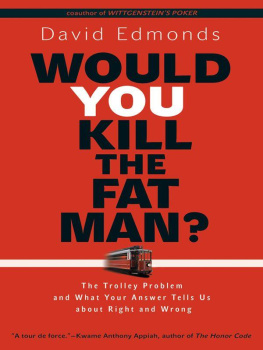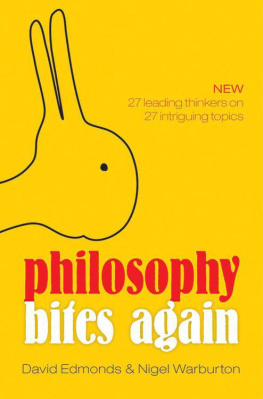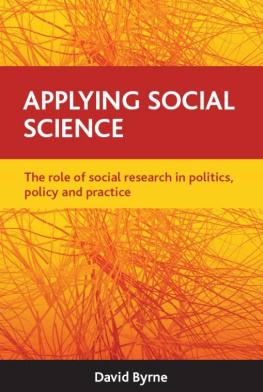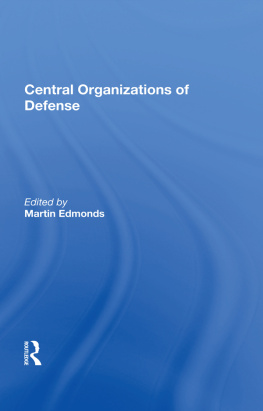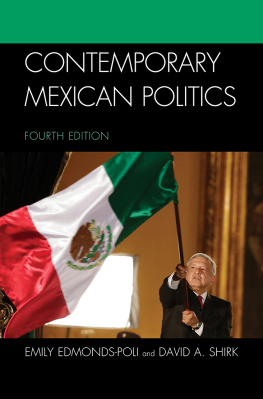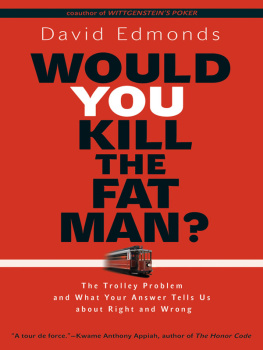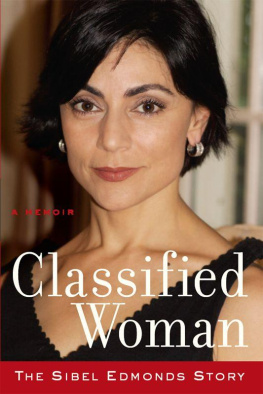SAGE Publications Ltd
1 Olivers Yard
55 City Road
London EC1Y 1SP
SAGE Publications Inc.
2455 Teller Road
Thousand Oaks, California 91320
SAGE Publications India Pvt Ltd
B 1/I 1 Mohan Cooperative Industrial Area
Mathura Road
New Delhi 110 044
SAGE Publications Asia-Pacific Pte Ltd
3 Church Street
#10-04 Samsung Hub
Singapore 049483
David Edmonds and Nigel Warburton 2016
First published 2016
Apart from any fair dealing for the purposes of research or private study, or criticism or review, as permitted under the Copyright, Designs and Patents Act, 1988, this publication may be reproduced, stored or transmitted in any form, or by any means, only with the prior permission in writing of the publishers or, in the case of reprographic reproduction, in accordance with the terms of licences issued by the Copyright Licensing Agency. Enquiries concerning reproduction outside those terms should be sent to the publishers.
Library of Congress Control Number: 2015948264
British Library Cataloguing in Publication data
A catalogue record for this book is available from the British Library
ISBN 978-1-4739-1379-0
ISBN 978-1-4739-1380-6 (pbk)
Editor: Kiren Shoman
Editorial assistant: Matt Oldfield
Production editor: Katherine Haw
Marketing manager: Michael Ainsley
Cover design: Wendy Scott
Typeset by: C&M Digitals (P) Ltd, Chennai, India
Printed and bound by CPI Group (UK) Ltd, Croydon, CR0 4YY
About the Editors
David Edmondsis an award-winning radio documentary maker for the BBC. He is the author and co-author (with John Eidinow) of several books, including
Wittgensteins Poker (short-listed for the Guardian First Book Award),
Bobby Fischer Goes To War (long-listed for the Samuel Johnson Prize), and
Rousseaus Dog. His most recent book is
Would You Kill The Fat Man? He is a senior research associate at Oxford Universitys Uehiro Centre for Practical Ethics.Nigel Warburtonis a freelance philosopher, podcaster and writer, described by Julian Baggini as one of the most-read popular philosophers of our time. His books include
A Little History of Philosophy,
Philosophy: The Basics,
Philosophy: The Classics,
Thinking from A to Z,
The Art Question, and
Free Speech: A Very Short Introduction.
The interviews for this book are based on a series of podcasts,
Social Science Bites, sponsored by SAGE.
Social Science Bites was inspired by the popular
Philosophy Bites podcast (www.philosophybites.com), which was founded by David and Nigel in 2007, and has so far had 26 million downloads.
Philosophy Bites has spawned three books,
Philosophy Bites,
Philosophy Bites Back, and
Philosophy Bites Again.
Foreword
Social science is a broad and diverse grouping, what Ludwig Wittgenstein called a family resemblance term. There are many overlapping resemblances between the activities carried out under its name, but no uncontroversial defining essence. Social scientists include some of the most interesting intellectuals alive today, some in departments of sociology, psychology, anthropology, economics, political science, epidemiology, media and cultural studies, and elsewhere; others resolutely inter-disciplinary, or beyond academic pigeonholing altogether. As with any family, there are long-running disputes and rivalries as well as impressive collaborations and remarkable individuals. These disputes include differences about the nature and appropriate methodology of the social sciences. It is almost impossible simply to be a social scientist without reflecting on what you are doing and whether or not it is the right way to go about things. This makes any discussion about the nature of social science both interesting and inconclusive. It is easier, and perhaps more enlightening, to examine a range of social scientists work, and to discuss how they understand what they are doing. This is what we have attempted in this book.
The book is a by-product of a podcast series. In 2012, we were approached by SAGE to conduct a series of interviews with leading social scientists. For some years we had already been running Philosophy Bites (www.philosophybites.com), interviewing philosophers about specific topics, and the idea was to do for social science what we had done for philosophy make available, free of charge, globally, significant research by significant figures, in an accessible audio format. The result was Social Science Bites (www.socialsciencebites.com) and we have already been fortunate to record interviews with many of the leading social scientists of the 21st century.
For this book, rather than simply present verbatim transcripts, in collaboration with the interviewees we have edited what they said in order to make the interviews work on the page, while keeping the spirit of conversation. Some interviewees made minor amendments; others took the opportunity to suggest more significant revisions.
We would like to thank the sponsors of the podcast, SAGE, and especially Ziyad Marar. Social Science Bites is Ziyads brainchild. He has been a pleasure to work with, combining a can-do attitude with relentless enthusiasm and intellectual curiosity, while allowing us extensive editorial freedom. We would also like to thank the rest of the team at SAGE, especially Katie Baker, Mithu Lucraft, Matthew Oldfield, Kiren Shoman, Katherine Haw and Michael Todd. Thanks also to Charles Styles, Hannah Warburton, and Mollie Williamson for transcribing interviews, and to Hannah Edmonds for proofreading the book.
For us, Social Science Bites has been both an adventure and a privilege. Weve met many inspirational thinkers, whove been happy to spare time talking to us about their invariably fascinating research. We are extremely grateful to all of them; their enthusiasm for their research has been contagious.
Social Science Bites is ongoing. The interviews can be found here www.socialsciencebites.
This book is dedicated to Ralph Oppenheimer.
David Edmonds
Nigel Warburton
June 2015
ROM HARR ON WHAT IS SOCIAL SCIENCE
Rom Harr
Rom Harr was for many years the University Lecturer in Philosophy of Science at the University of Oxford. Moving from the philosophy of the physical sciences in the mid-seventies, he began a long series of studies of the metaphysics and related methods of research in the human sciences. He has been much involved in the Spanish world, including South America. Currently he is a member of the Psychology Department of Georgetown University, Washington DC.









